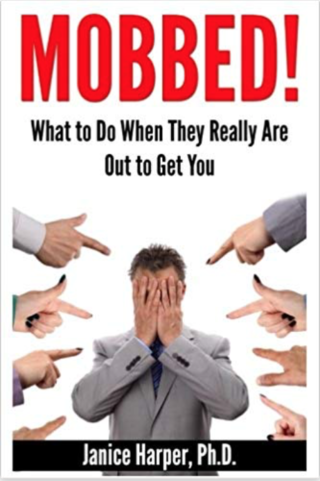Bullying
Mobbed: What to Do When They Really Are Out to Get You
Don't file a workplace bullying complaint until you read this book.
Posted April 9, 2019

Do you feel bullied at work? Are you considering filing a bullying complaint to management or hiring a lawyer to sue your company? If you are concerned about your career or your emotional, physical and financial well-being, you must first read Mobbed: What to Do When They Really Are Out to Get You, by anthropologist Janice Harper. If you don’t, and instead follow the typical legal advice on responding to workplace bullying, you may find yourself in a steep decline to a living hell.
There are few professionals who understand the subject of bullying as well as Harper. She is too intelligent, educated, independent-minded and burnished by real-life experience as a victim of workplace mobbing—what Harper defines as "group bullying run amuck"—to buy into the platitudes promoted by the anti-bullying field. Since her personal painful experience of having her world torn asunder by workplace mobbing, she has spoken to hundreds of other targets of workplace bullying as well as experts in bullying, and she has discovered the naiveté of the official declarations that you have a legal right to a bully-free workplace.
While she is totally compassionate to those suffering at the hands of other people at work, Harper is brutally honest and is not out to sell you any fantasies that will feed your self-righteous anger at your bullies. She is sharp enough to recognize the problems with the bullying psychology, and unmasks the myths and lies it has proliferated. She lists them as follows (pages xviii – xix):
- That bullies are psychopaths
- That bullies are bad people
- That destroying and eliminating bullies is a good thing, done by good people
- That once the bully is gone, the problem is resolved
- That if you think you’re being bullied at work, then you are being bullied
- That if you’re being bullied at work, you must be an excellent employee
- That if you’re under attack you did nothing to bring it on
- That all you need is a lawsuit, and the bully will pay, while you can get your life back
Harper astutely warns that if you hold these beliefs, you will be unprepared for the escalating aggression that comes your way when even the “good people” turn against you. You will be likely to either decay into a state of powerless victimhood or become an aggressor in your own right.
The book reminded me of my own history of turning to the higher-ups for help with unfair treatment on the job. Whether I was working as a waiter, a summer camp dining room manager or a school psychologist, I never ended up getting what I considered to be justice.
About a dozen years ago, I read the cleverly-titled book, Uncivil Rights, by law professor Frederick Golder. It is filled with case studies of employees who sought legal redress for infringements of their workplace rights, and the great majority were disaster stories.
Twenty years of following the school anti-bullying movement has only confirmed the foolhardiness of expecting reliance on authorities to resolve student grievances against their schoolmates. Sometimes the school authorities succeed in putting a stop to the bullying, especially when the situation is relatively mild and when the school treats it as a problem that needs to be solved rather than a crime that needs to be investigated, judged, and punished. But anti-bullying laws require schools to take the latter approach, which almost always leads to an upward spiral of intensified hostilities while diverting considerable faculty time (and our taxpayer dollars) away from education. That’s why the more intensively society has combatted bullying, the more serious and intractable the bullying problem has become, accompanied by a skyrocketing percentage of students committing suicide and serious violence over bullying.
Thus, I have long been disabused of the belief that the bureaucracies created to help us against bullying are our salvation. And that’s why I can so greatly appreciate Harper’s book.
The literature often refers to bullying as strictly learned behavior and ascribes it to our bullying culture. This means that if people didn’t learn to be bullies, there wouldn’t be any and that we can eliminate bullying by creating an anti-bullying culture. Harper, on the other hand, shows us that bullying and mobbing are common among primates and other animals, and are thus social behaviors resulting from our hardwired psychobiological makeup. She lays out in riveting detail the steps that can turn even the best of employees into a pariah, with their most stalwart friends having turned against them, just as this process happens among our primate relatives in nature.
In other words, bullying is not only culture but also nature, and nature is not easy to change. We have, today indeed, created the most anti-bullying culture in history, yet bullying continues to be a ubiquitous problem. Furthermore, as Harper, myself, and others who have dared to criticize the anti-bullying dogma have discovered, even some anti-bullying activists can engage in nasty bullying.
Mobbed focuses on saving those of us who have already been sucked into the elimination maelstrom at work. It teaches us how to stay afloat, how to avoid swallowing water, and how to free ourselves for a better work future somewhere else. However, like the classic movie, The War of the Roses, in which the lawyer played by Danny DeVito relates the nightmare divorce tale of Mr. and Mrs. Rose in order to deter other couples from filing for divorce, Mobbed is perhaps even more valuable if you are in the early stages of bullying and beginning to contemplate following the official advice. By showing how filing complaints, amassing evidence against your bullies, and attempting to enlist colleagues on your side can escalate the abuse rather than mitigate it, the book can prevent you from getting into a state of no return. As Harper says regarding her own experience,
…had I simply ignored the small injustices, I never would have experienced the great ones. If I had laughed off the bad behaviors, I never would have suffered the atrocities. (Page 123)
The commonly recommended procedures are almost bound to create a state of war in which you are seen as the enemy of the company. While you will be claiming that others are the bullies, you are the one most likely to get branded a bully. The reason anti-bullyism is such an incredibly popular movement is that everyone thinks the bully is the other person. We are shocked when we find the bully label used against us.
Mobbed intends to save us from such a fate. Among its wise advice is to “run, not walk, from [filing a] lawsuit if there’s any chance of finding another job,” especially if you are under fifty (page 119). The suit will drag on for years while dragging down your psychological, spiritual and financial health along with it. The smear campaign will get uglier as the employer—and your colleagues—set out to prove you were a bad employee, no one liked you, and you deserved to be expelled. Hard as it may be to accept such a blow to your belief in the legal justice system, she is teaching us to be mature adults, and that is far more beneficial.
I cannot do justice to Mobbed without writing a piece even longer than the book. If you are being bullied at work, run, don’t walk, to get a copy. You will be forever grateful you did.




